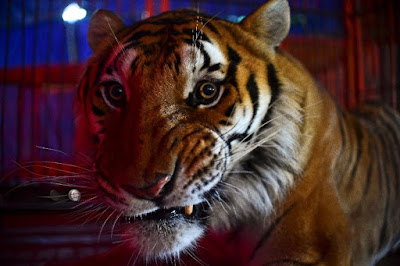Yahoo – AFP,
July 28, 2015
 |
Giant panda
Jia Jia stands next to her cake made of ice and fruit juice to mark
her 37th
birthday at an amusement park in Hong Kong on July 28, 2015 (AFP
Photo/Philippe
Lopez)
|
Hong Kong
(AFP) - It may not be considered a landmark birthday for humans, but turning 37
on Tuesday made Hong Kong's Jia Jia the oldest-ever giant panda in captivity,
and she celebrated in style.
The
equivalent of more than 100 years old in human terms, Jia Jia was presented
with a towering birthday cake made from ice and fruit juice with the number 37
carved on top in her enclosure at the city's Ocean Park theme park.
"Jia
Jia has achieved two Guinness world record titles -- the oldest panda living in
captivity and the oldest panda ever living in captivity," said Blythe Ryan
Fitzwilliam, adjudicator of Guinness World Records, during a ceremony at the
park.
He offered
her his congratulations, saying it was an "amazing longevity
achievement".
Jia Jia was
born in the wild in Sichuan, China in 1978 and was given to Hong Kong in 1999
to mark the semi-autonomous city's handover by Britain two years earlier.
The
previous record was held by a male panda called Du Du, who was also caught in
the wild and died in July 1999 at the age of 36 in a zoo in China's Hubei
Province.
Vet Paolo Martelli
said Jia Jia was still "moving about" though she suffered from
cataracts and high blood pressure.
"She
is sleeping more, so is doing everything less. But she is ageing gracefully,
just like your grandma," he said.
 |
Jia Jia was
born in Sichuan, China in 1978 and was given to Hong Kong in
1999 to mark the
handover by Britain two years earlier (AFP Photo/Philippe Lopez)
|
Because she
eats less bamboo she relies on fibre supplements, Martelli added.
Jia Jia,
whose name translates as "excellence", picked at fruit slices and
bamboo around the ice cake to celebrate her big day.
Although
the exact birth dates of Du Du and Jia Jia are unknown because they were born
in the wild, Guinness said that based on the evidence, they've concluded that
Jia Jia had claimed the title by a few months.
There are
fewer than 2,000 pandas now left in the wild, according to the World Wildlife
Fund, as their habitats have been ravaged by development.
Roads and
railways cut through the bamboo forests they depend upon in China's Yangtze
Basin, their primary habitat. Pandas rely on bamboo and eat almost nothing
else.
Given their
low birthrate, captive breeding programmes have become key to ensuring their
survival.























